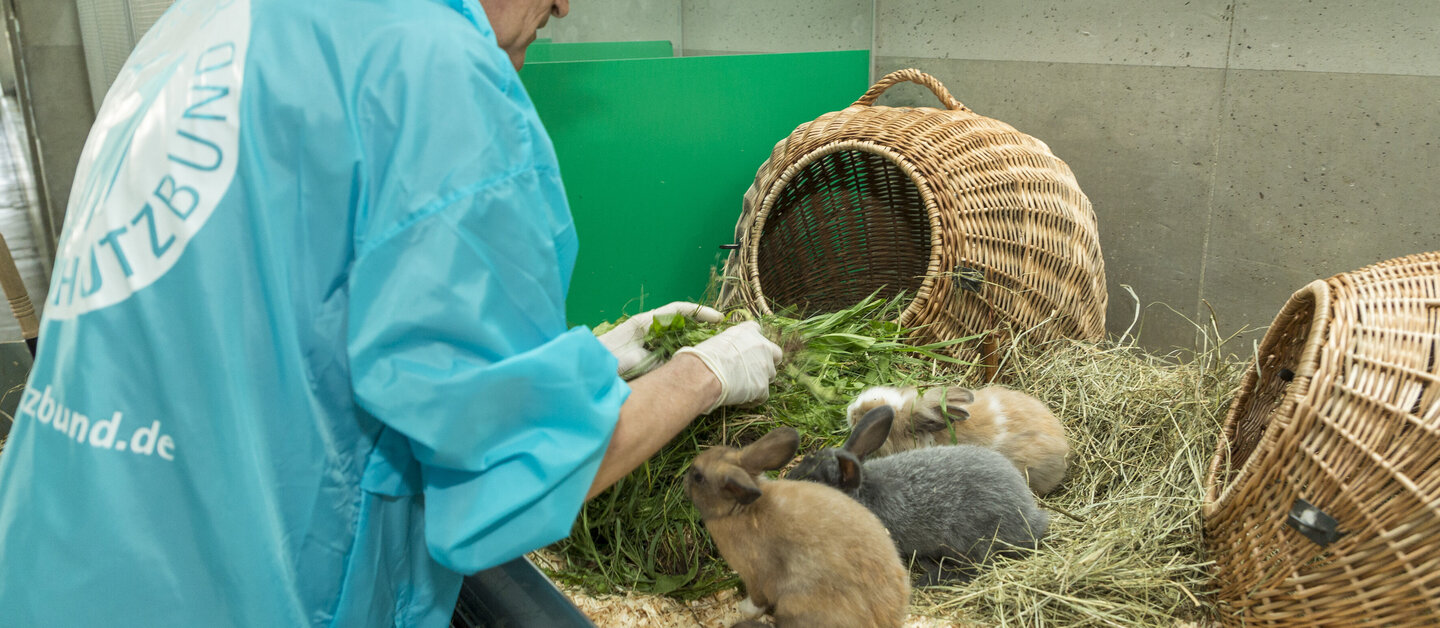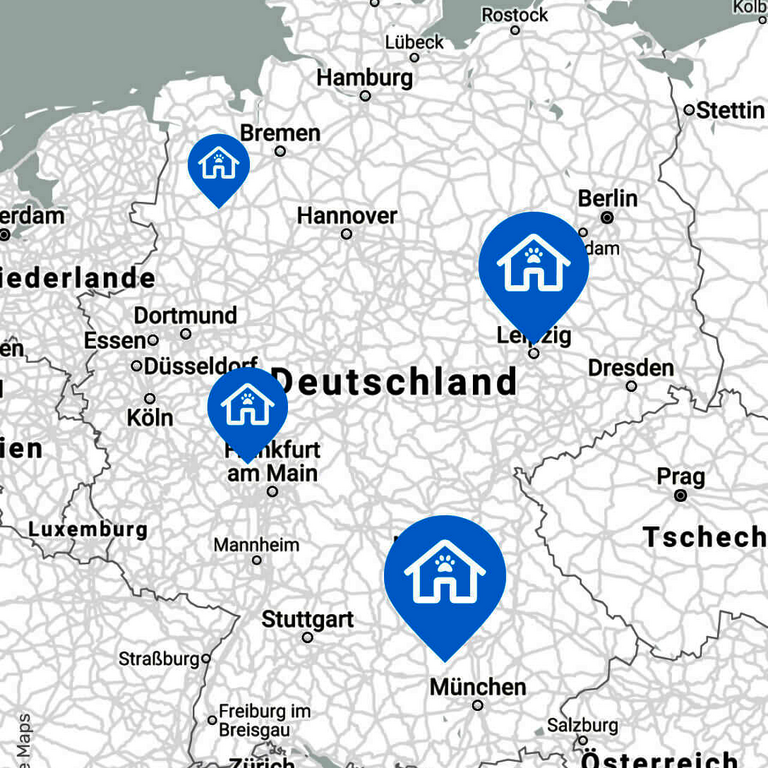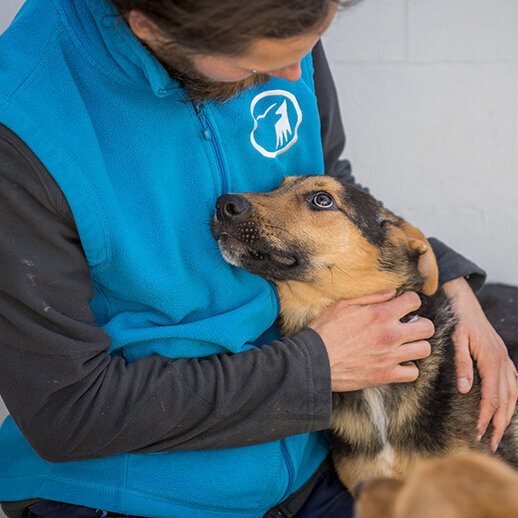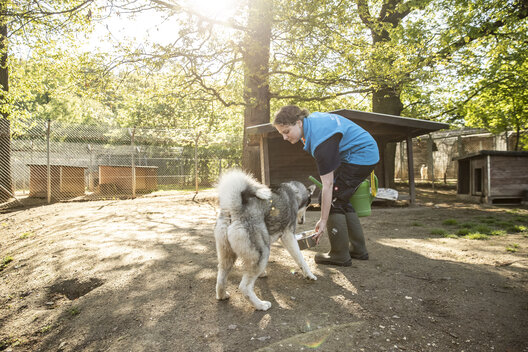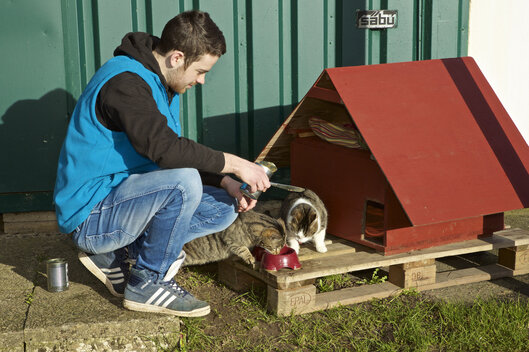What animal shelters do for animals, people and communitiesWhy animal shelters are so important
Animal welfare would be impossible without animal shelters. They do exemplary work for dogs, cats, rabbits, etc. that have run away, been abandoned or are in need, taking on tasks that should actually be carried out by cities and municipalities. However, local authorities rarely bear the full costs. This is another reason why most animal shelters have long been working at their limits.
Animal shelters work day in, day out for the animals
Animal shelters are the heart and basis of animal welfare work. Animal shelters do a great job and ensure that every animal receives food, care and attention. When people abandon or surrender animals, owners die, authorities rescue pets from poor conditions or confiscate animals from illegal breeding and transportation, their teams work tirelessly. Animal shelters help day after day, at weekends and on public holidays, around the clock in an emergency. Whether it's dogs, cats, rabbits, guinea pigs and budgies or even special exotic animals - full-time and volunteer animal welfare workers work together at the animal shelter. Every animal counts for them. The staff take in the animals, feed them, provide them with medical care and prepare them for a life with animal-loving people to whom they are placed. And, of course, they are also there for people who have questions about animal welfare, want to report neglected animals in their neighborhood or want to adopt an animal. Many animal welfare organizations also carry out valuable youth work.
Animal shelters take on social tasks
The social importance of animal shelters can hardly be put into words. They care for hundreds of thousands of dogs, cats, birds, rabbits and other small pets, as well as domestic and exotic wild animals in Germany every year. Most of them are found animals. Legally, they are considered lost property. It is therefore the duty of cities and municipalities to accommodate them. However, most of them do not have the resources to do so. They then pass this task on to the local animal shelters.
Animal shelters are too often left with the costs
Animal shelters are only rarely municipal facilities. They are usually run by animal welfare organizations. The local authorities usually conclude a so-called "found animal contract" with them. However, the amounts agreed in these contracts often only cover part of the actual costs incurred by the animal shelters. If they have to provide veterinary care for animals or it takes a long time to find them a new home, for example, it becomes significantly more expensive for the animal shelters. The animal welfare organizations pay the rest out of their own coffers. This is despite the fact that they fulfill mandatory municipal tasks. Even the placement or surrender fees do not help. These are no more than a drop in the ocean. That's why animal welfare campaigners are looking for donations, sponsorship, memberships, sponsorships and inheritances. Above all, the federal, state and local governments urgently need to take responsibility.
Animal shelters are at their limit
The teams in the animal shelters are constantly reaching their limits. In many places, they are constantly working at the limit and need more space, staff and time. Two out of three animal shelters are (almost) permanently full. There are many reasons for the enormous workload. One of them is the coronavirus pandemic and its consequences. While social contacts were only possible to a limited extent, many people rashly acquired pets. However, many of those who decided on the spur of the moment only realized afterwards how demanding it is to look after them and how much work it is. This has led to a large number of surrenders. These are extremely demanding for the shelter staff. In addition, there are animals from the illegal puppy trade and animal hoarding cases. They overcrowd the animal shelters and push them to their limits. More and more often, the facilities have to impose admission freezes. In addition, skyrocketing energy prices, inflation and higher fees are making it increasingly expensive to heat the shelters, house the animals, feed them and have them treated by a vet. Economic developments as a result of the Russian war of aggression against Ukraine and declining donations have made the situation even worse. In fact, the situation at animal shelters is more dramatic than ever before.
How you can help animal shelters
Many people shy away from visiting an animal shelter because they are burdened by the fate of all the animals. Or they have bought into the rumor that shelter animals are all 'disturbed'. However, there are very special and lovable animals waiting to be adopted. So if, after careful consideration, you have decided that an animal should move in with you permanently, go to the local animal shelter first. The local teams will work with you to find the animal that suits you best.
You can help the animal shelters and thus the animals directly with donations of all kinds - whether monetary donations or donations in kind such as towels, blankets or food. The best way to find out what is most urgently needed is to contact your nearest animal shelter.
Volunteer help can hardly be outweighed: if you enjoy walking dogs, stroking cats or helping out by cleaning enclosures and doing manual work on a regular basis, these are invaluable assets for any animal shelter.
Tell friends or acquaintances who are considering giving animals a home themselves or who could support an animal shelter about the work of animal welfare organizations and encourage them to visit. Animal shelters rely on such word-of-mouth advertising. You can also support the campaign "Tierheime helfen. Help animal shelters!" campaign, for example by posting photos of your pets on social media with the hashtag #MyShelterAnimal
We use the money from our fire department fund to help animal shelters quickly and unbureaucratically in emergencies so that no animal has to be left outside. Otherwise, many animal shelters would no longer be able to cope with the financial burden.
How we help animal shelters











1 e.g. assessment of an animal shelter in accordance with the animal shelter regulations, support in planning improvement measures, help with medical and technical issues, advice on new construction and conversion plans, etc.
2 e.g. the seminar on proof of expertise
3 e.g. argumentation aid for the reimbursement of found animal costs, public relations guidelines and many more
4 e.g. building aid, fire department fund for emergencies, support for neutering campaigns, etc.

